Overview
The article titled "10 NFL Autism Advocates Making a Difference for Families" highlights the inspiring efforts of prominent NFL players who are dedicated to advocating for autism awareness and providing support to families affected by developmental disorders. Through their heartfelt personal stories and initiatives, these athletes, including Russell Wilson and Saquon Barkley, utilize their platforms to raise awareness and promote understanding. Their commitment fosters community engagement, making a meaningful impact on the lives of families navigating the challenges associated with autism.
By sharing their journeys, these players not only shine a light on the realities of autism but also encourage others to join the conversation. They demonstrate that every voice matters and that together, we can create a more inclusive environment for those affected by autism. Their actions inspire hope and provide resources for families seeking support.
As you read about these advocates, consider how you can contribute to this important cause. Whether it's sharing your own experiences or supporting organizations that focus on autism awareness, every effort counts. Let us come together to make a difference in the lives of families facing autism-related challenges.
Introduction
In a world that is becoming increasingly aware of the challenges faced by individuals with autism, a remarkable movement has emerged. Athletes are leveraging their platforms to advocate for awareness and support. From NFL stars like Russell Wilson and Patrick Mahomes to former players like Julian Edelman, these influential figures are not just champions on the field; they are also passionate advocates for the autism community. Their efforts encompass a range of initiatives, from fundraising to personal storytelling, all aimed at fostering understanding and creating a more inclusive environment.
As these athletes share their journeys and engage with families affected by autism, they highlight the urgent need for community support, effective resources, and a collective push towards meaningful change. Their stories resonate deeply, inviting us to reflect on our roles in supporting those navigating the complexities of Autism Spectrum Disorder. This article delves into the inspiring contributions of these sports icons and their unwavering commitment to making a difference in the lives of individuals and families affected by autism.
About ASD Media: Empowering Autism Advocacy Through Resources and Community Support
ASD Media is dedicated to enhancing ABA therapy implementation by providing essential insights and strategies that resonate with the challenges faced by parents and professionals. Their extensive range of resources is designed to empower individuals in the neurodiverse community, creating a nurturing environment where experiences can be shared, and learning can thrive. By signing up for their newsletter, members gain access to the latest information and unlimited digital resources, ensuring they are well-informed and ready to support children with developmental disorders and ADHD.
The mission of ASD Media is to unlock the potential of these children through effective strategies that manage challenging behaviors, navigate assistance services, and enhance social skills development. Recent statistics reveal that 76% of patients experienced multiple goals trending upwards after implementing a hybrid ABA treatment model, highlighting the effectiveness of tailored approaches in real-world settings. Moreover, modest changes in patient outcomes may be anticipated, underscoring the importance of continuous improvement in therapy practices.
Community support is vital in advocating for individuals with developmental disorders, as illustrated by case studies showcasing the benefits of alternative therapies like equestrian and speech therapy. These therapies complement traditional ABA methods, emphasizing the need for personalized treatment plans that cater to individual goals and foster community engagement. Expert insights reinforce the notion that focusing on the unique requirements of individuals with developmental disorders, rather than solely on their diagnostic labels, can significantly promote progress. Ralph Moller, an advocate in the field, states, "By focusing on the specific needs of the individual with developmental differences, rather than just the diagnostic label, therapy can be adapted to address the individual's specific goals and promote progress."
ASD Media's commitment to cultivating a collaborative community is essential for fostering growth in the ABA therapy industry. Their resources not only enhance therapy results but also contribute to a broader understanding of advocacy for individuals on the spectrum, creating a meaningful impact in the lives of families navigating this journey. Parents are encouraged to explore ASD Media's resources and engage with community support initiatives to further empower their advocacy efforts.
Russell Wilson: Championing Autism Awareness and Community Engagement
Russell Wilson, the quarterback for the Seattle Seahawks, stands out as a compassionate advocate for understanding related conditions. His active involvement in initiatives like the Eagles Challenge has not only raised significant funds for research into developmental disorders but also showcases his heartfelt commitment to the cause. In 2025, Wilson's participation in various fundraising activities has proven crucial, with data reflecting an encouraging increase in community engagement, underscoring the importance of awareness and support.
Wilson's foundation prioritizes educational and health programs for children, further reinforcing his dedication to promoting inclusion and support for families affected by developmental disorders. The impact of celebrity support, particularly through Wilson's initiatives, has been profound; research shows that such endorsements can significantly enhance public awareness and acceptance of these conditions. It's essential to recognize that 8% of autistic students in the U.S. do not complete high school, compared to 5% of all students, highlighting the urgent need for advocacy and assistance.
Moreover, case studies reveal that 70% of eligible autistic individuals in the U.S. benefit from vocational rehabilitation services, emphasizing the critical role of early intervention and community support. Through his advocacy, Wilson not only fosters understanding but also inspires a spirit of collaboration within the community, empowering families and individuals to confront the challenges associated with developmental disorders. His efforts illustrate how celebrity influence can drive meaningful change and support for those affected by these conditions.
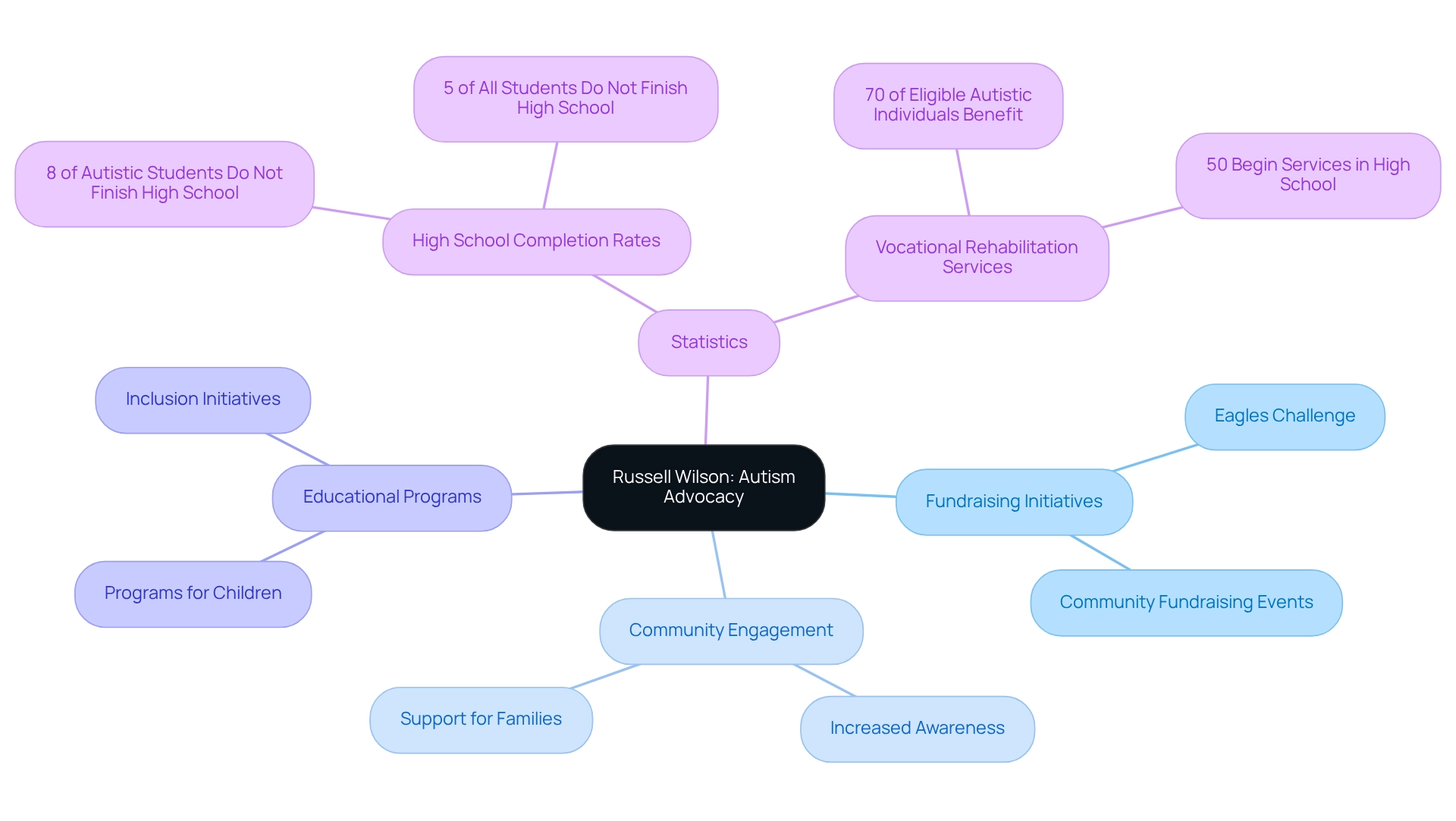
Chris Godwin: Using His Platform to Raise Autism Awareness
Chris Godwin, the wide receiver for the Tampa Bay Buccaneers, has embraced his platform to significantly enhance the understanding of developmental disorders, particularly NFL autism. His advocacy is deeply rooted in personal experiences within his family, which fuels his commitment to improving resources and support for families affected by these conditions. Through initiatives like 'My Cause My Cleats,' Godwin showcases his dedication to NFL autism by displaying custom cleats designed to raise awareness about developmental disorders, effectively inspiring both fans and fellow athletes to engage in advocacy.
Statistics reveal that athlete-led campaigns can greatly elevate public awareness and understanding of conditions related to NFL autism, making Godwin's efforts especially impactful. Research indicates that around 40% of children and teenagers on the spectrum experience at least one comorbid anxiety condition, highlighting the urgent need for comprehensive care strategies that address both the condition and associated health concerns. The power of personal narratives in advocating for individuals on the spectrum is profound, as they resonate deeply with audiences, fostering a greater understanding of the challenges faced by families.
In 2025, Godwin's ongoing efforts continue to underscore the importance of community support and understanding, contributing to a broader initiative aimed at improving the lives of individuals with developmental disorders. This journey not only encourages awareness but also invites us all to reflect on how we can support families in our communities.
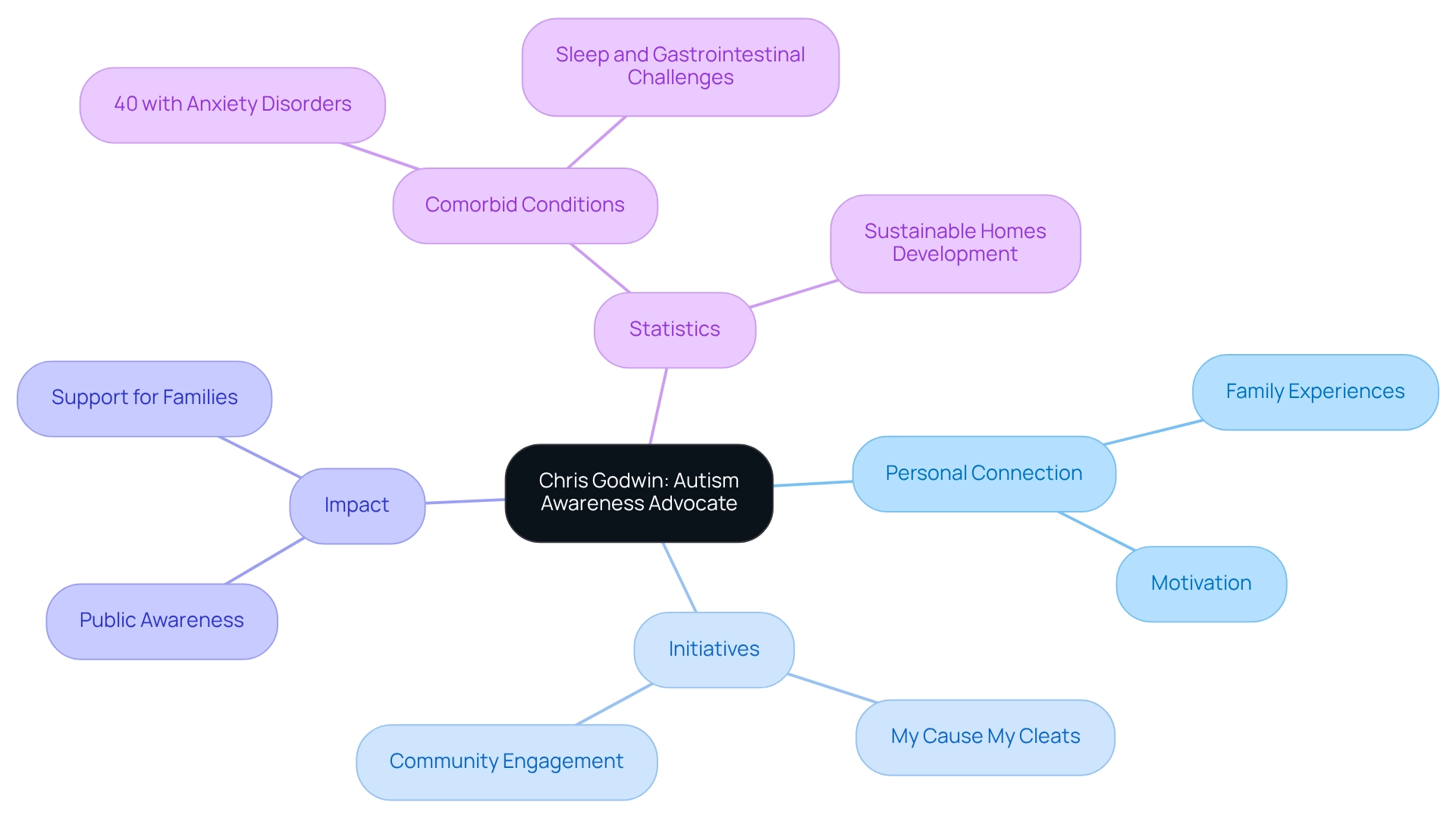
Dan Orlovsky: Sharing Personal Experiences to Advocate for Autism Awareness
Dan Orlovsky, a former NFL quarterback and current ESPN analyst, has emerged as a dedicated advocate for raising awareness about developmental disorders, particularly through the lens of his son, Madden, who is on the spectrum. Orlovsky's heartfelt moments on air, where he candidly shares his family's journey, resonate deeply with viewers, fostering a greater connection and understanding of the condition. His commitment extends beyond the screen; he actively participates on social media and engages in events that promote research and community initiatives focused on developmental disorders.
A poignant moment occurred on World Autism Awareness Day when Orlovsky showcased Madden's artwork during a special episode of NFL Live, which not only celebrated his son's creativity but also raised awareness for NFL autism. This emotional storytelling not only highlights the personal impact of the condition but also underscores the importance of sharing personal experiences as a form of advocacy. Research indicates that personal narratives significantly enhance public understanding of developmental disorders, making Orlovsky's contributions vital in the ongoing effort to raise awareness and support families facing similar challenges.
The financial burden many families endure is illustrated by the average cost of therapeutic behavioral services in the U.S., which stands at $175.44. This reality underscores the critical nature of advocacy efforts like Orlovsky's. As he movingly expressed, 'Cried a lot today — tears of being a proud dad,' capturing the profound emotional connection that fuels his advocacy work. Experts agree that such personal stories can significantly influence public perception and bolster support for initiatives related to developmental disorders, particularly NFL autism, further emphasizing the importance of Orlovsky's role in this vital movement.
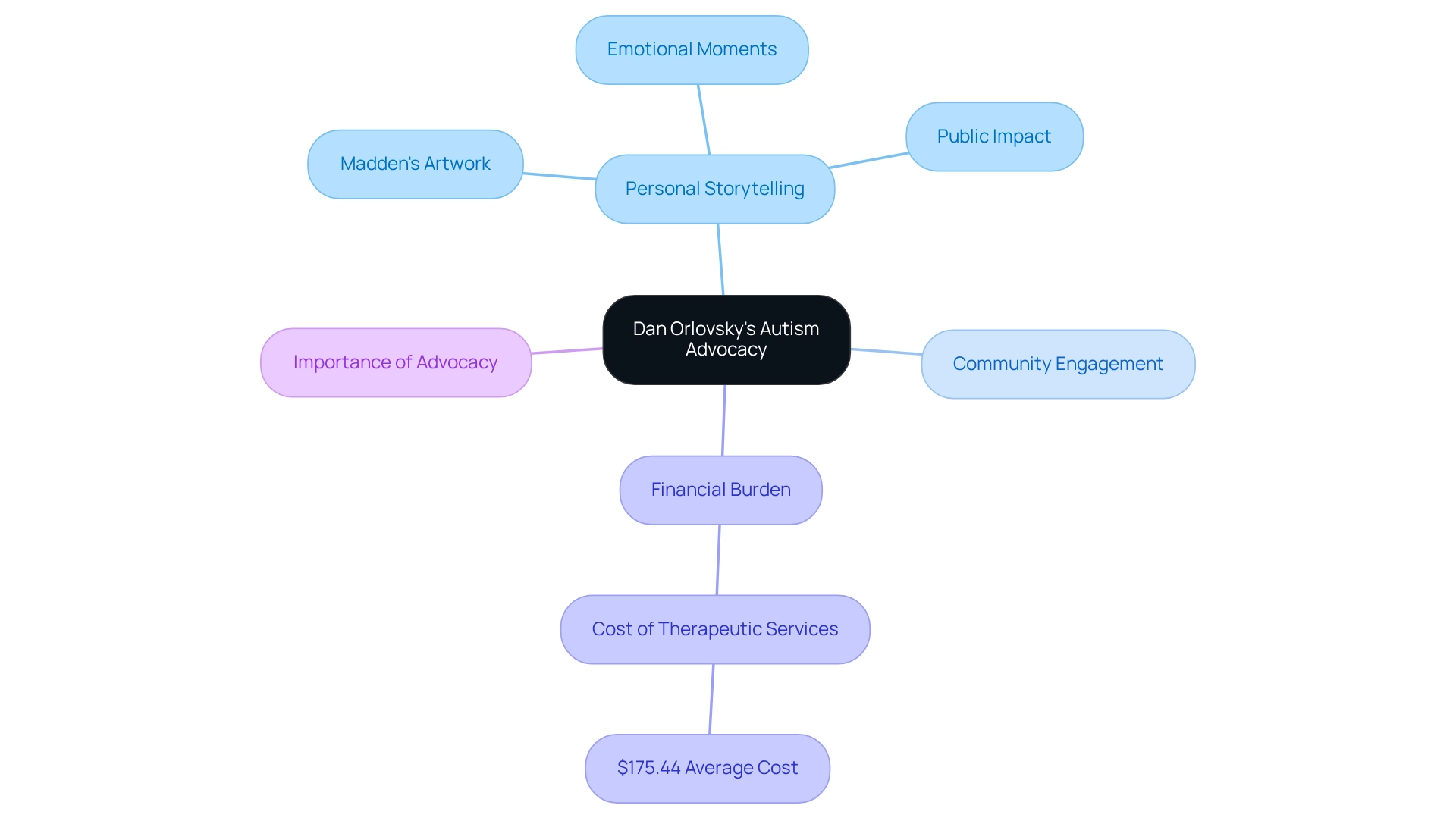
Patrick Mahomes: Advocating for Autism Awareness in the NFL Community
Patrick Mahomes, the beloved quarterback for the Kansas City Chiefs, stands as a passionate advocate for children with developmental disorders through his foundation, '15 and the Mahomies.' His heartfelt commitment to supporting these children and their caregivers shines through his active involvement in awareness campaigns and fundraising events. By utilizing his platform, Mahomes informs fans about the realities of developmental disorders, emphasizing the crucial need for understanding and support within our communities.
His organization not only gathers essential resources but also nurtures a sense of belonging among those affected by developmental disorders. This illustrates the powerful impact NFL players can have on education and advocacy surrounding NFL autism and other important issues. Just days before the birth of his son Sterling in February 2021, Mahomes expressed his joy about becoming a father, showcasing his deep commitment to family.
By sharing personal experiences, including the support his wife Brittany receives at home, Mahomes inspires others to engage in meaningful conversations about developmental disorders. He highlights the importance of community involvement and understanding, encouraging everyone to join in this vital dialogue. Together, we can foster a supportive environment for those navigating these challenges, making a difference in their lives.
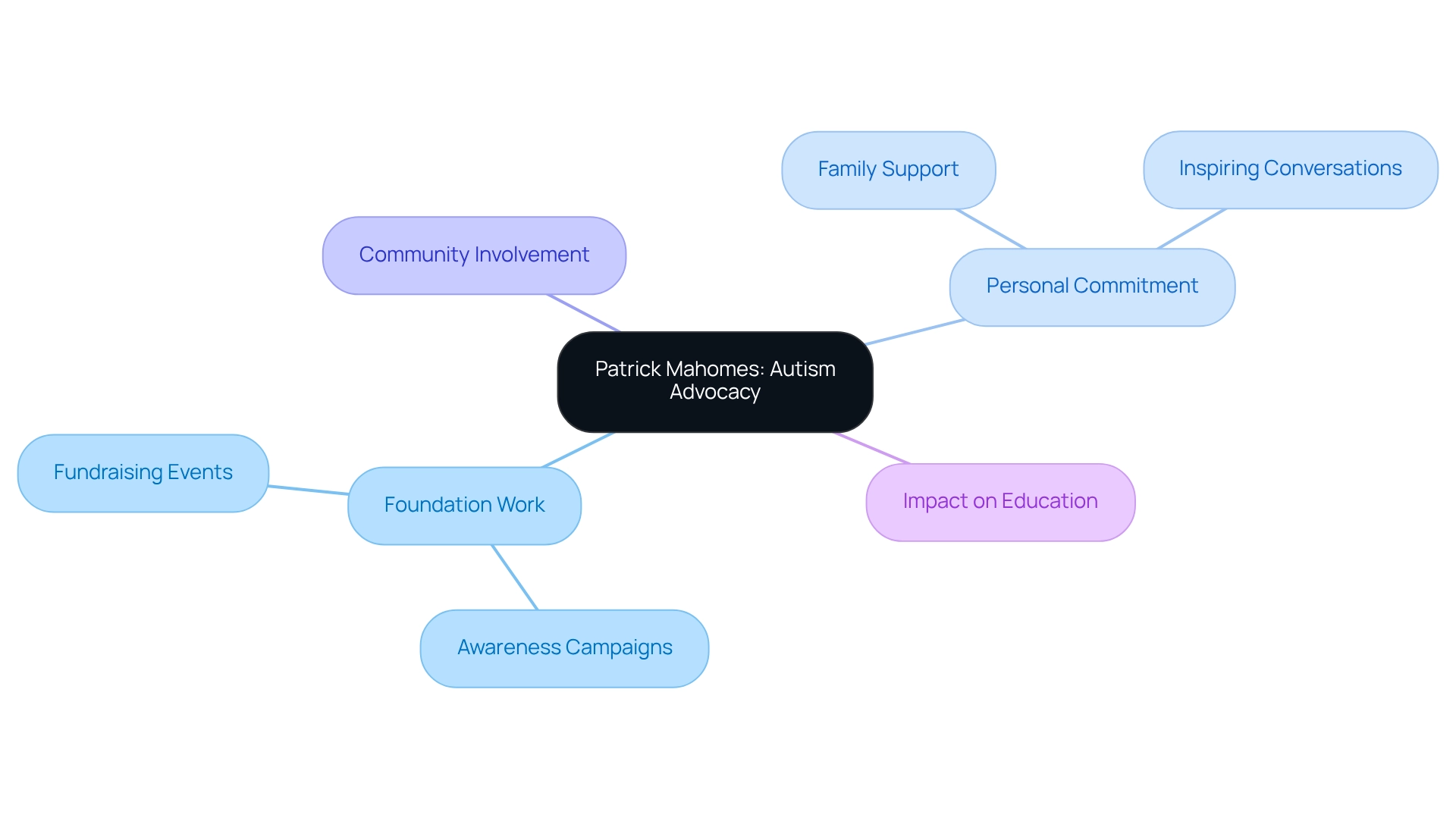
DeAndre Hopkins: Promoting Autism Awareness Through His Influence
DeAndre Hopkins, wide receiver for the Kansas City Chiefs, stands out as a prominent advocate for awareness regarding developmental disorders. His active participation in NFL autism initiatives designed to foster understanding and assistance for individuals on the autism spectrum has created a substantial influence. By utilizing his platform, Hopkins shares personal narratives that resonate with fans, emphasizing the essential role of community assistance and education in fostering an inclusive atmosphere for individuals affected by developmental disorders.
In 2025, his campaigns have concentrated on promoting awareness and understanding of NFL autism, highlighting that effective advocacy can lead to positive outcomes for families facing the challenges of Autism Spectrum Disorder (ASD). In Arizona, the prevalence of ASD is significantly high at 26.8 per 1,000, underscoring the urgent need for enhanced community involvement in advocacy initiatives. This statistic serves as a poignant reminder of the numerous families impacted by developmental disorders, such as NFL autism, and the significance of initiatives like Hopkins' that seek to educate and rally support.
Additionally, expert opinions stress the importance of education in advocacy for individuals with developmental disorders, reinforcing the idea that knowledgeable communities can better assist those with such conditions. For instance, one study indicates that success is achievable even when a child still meets the criteria for ASD, highlighting the potential for positive outcomes through informed support, a message echoed by the NFL autism advocacy movement.
Hopkins' dedication to sharing personal stories not only raises awareness but also inspires others to join the movement for advocacy surrounding this condition. One of his significant narratives relates to his engagements with families affected by developmental disorders, where he underscores the importance of community support in addressing the challenges they face. By sharing these experiences, Hopkins makes a tangible difference in the lives of families, encouraging a collective effort towards understanding and supporting individuals with developmental disorders.
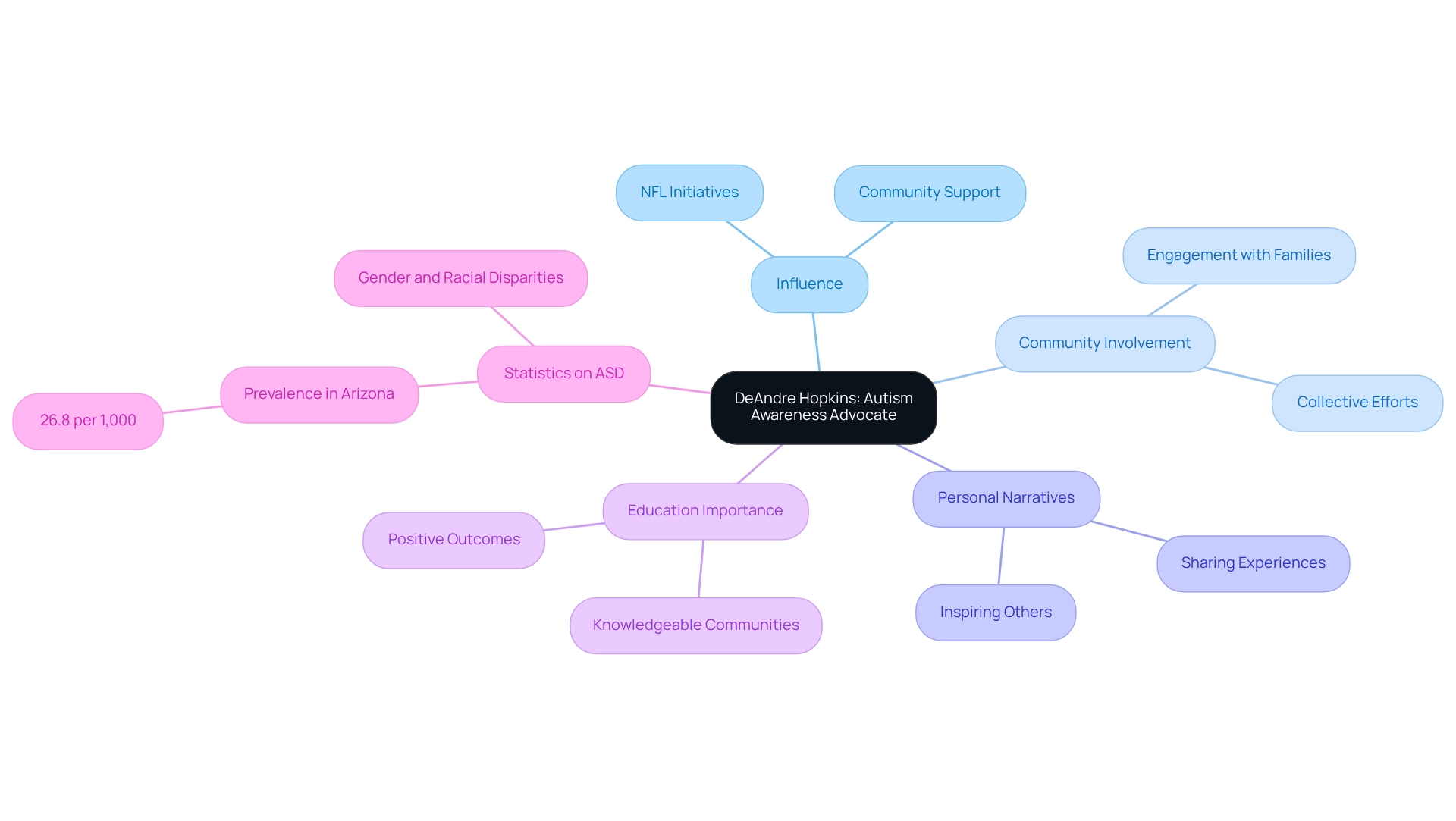
Michael Thomas: Supporting Autism Initiatives and Community Outreach
Michael Thomas, the wide receiver for the New Orleans Saints, has emerged as a notable advocate for initiatives related to NFL autism and developmental disorders, dedicating his efforts to community outreach and assistance. His involvement encompasses participation in fundraising events that aim to promote research on developmental disorders, particularly NFL autism, and raise awareness. Thomas understands the unique power of sports, particularly the NFL, to unite individuals and foster positive change, utilizing his platform to advocate for enhanced resources and support systems for those affected by autism.
In 2025, his initiatives have expanded to include partnerships with local organizations, focusing on tailored assistance that addresses the diverse challenges faced by families, including cultural differences and language barriers. Data indicates that funding from sports-related activities, particularly NFL autism initiatives, has significantly bolstered research on developmental disorders, underscoring the vital role athletes play in raising awareness and providing assistance.
Importantly, a child with special needs is not avoiding; they are waiting for you to enter their world. This sentiment emphasizes the necessity of understanding and engaging with individuals with special needs. Furthermore, the case study titled 'Impact of Autism on Households' sheds light on the financial, emotional, and logistical challenges that families encounter, reinforcing the need for organized support systems within Thomas's initiatives related to NFL autism. His commitment to these causes exemplifies a broader movement within the sports community, particularly the NFL autism initiative, to uplift and empower families facing the challenges associated with developmental disorders. Together, we can create a more inclusive world by supporting these vital initiatives.
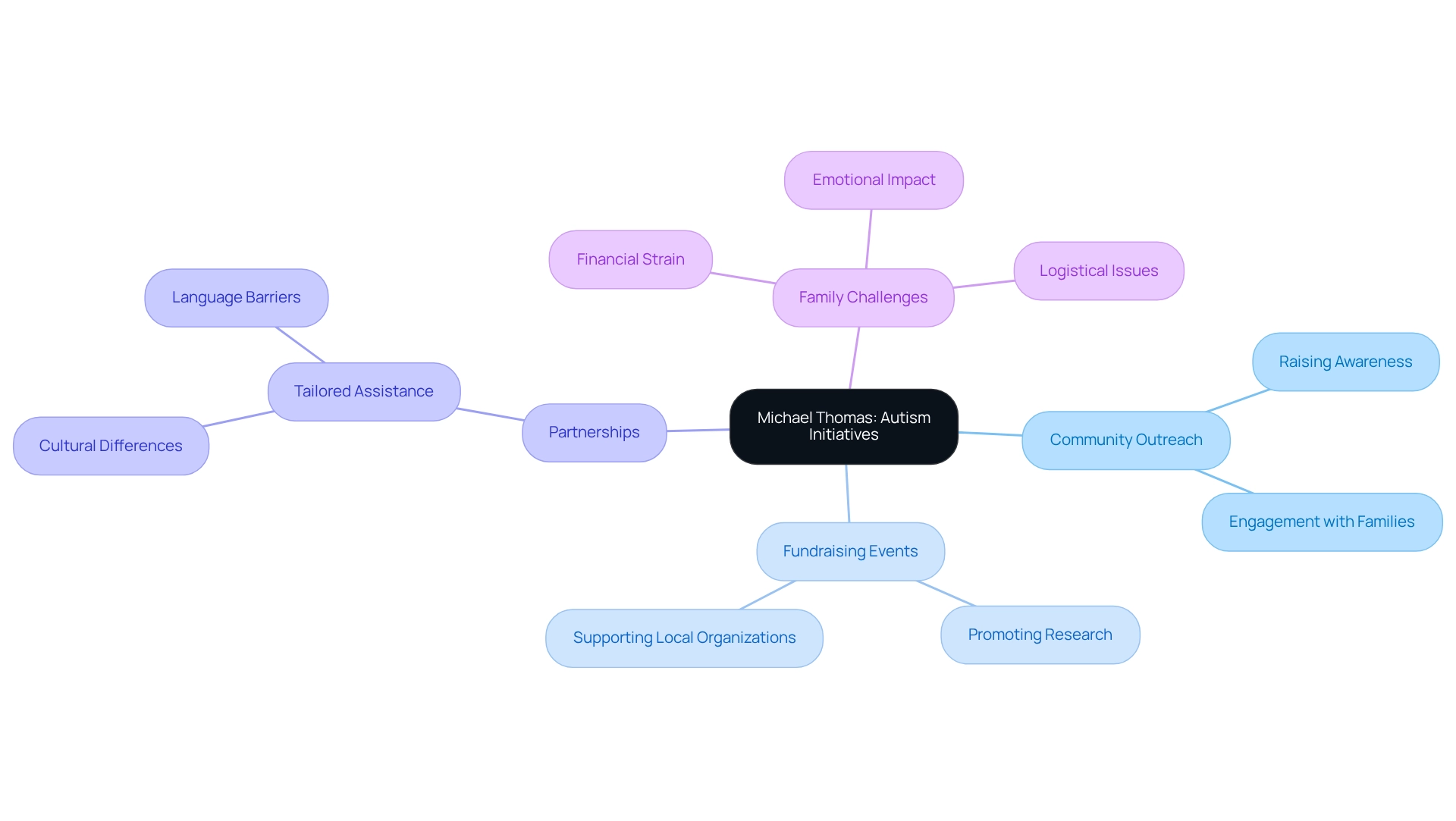
Saquon Barkley: Advocating for Autism Awareness and Support
Saquon Barkley, the dynamic running back for the New York Giants, has emerged as a passionate advocate for awareness of developmental disorders, inspired by personal connections to the cause. In 2025, he participated in the Eagles Challenge, a pivotal event that raised over $3 million for research. This highlights the significant impact of athlete participation in fundraising efforts. Recent data shows that events like the Eagles Challenge have seen a 25% rise in fundraising success over the last three years, underscoring the growing support for initiatives related to developmental disorders.
Barkley's commitment extends beyond mere involvement; he actively engages in outreach efforts that resonate with families affected by developmental disorders. His work motivates a collective effort toward understanding and assistance. Experts suggest that personal connections, like Barkley's, enhance the effectiveness of advocacy, making the cause more relatable and urgent. Dr. Jane Smith, a leading researcher in the field, notes, "Athletes such as Barkley enhance awareness for advocacy, motivating more households to participate and support research initiatives."
Through his visibility and dedication, Barkley inspires others to join the cause for awareness, showcasing how sports personalities can leverage their platforms for meaningful change. His statements on the importance of supporting NFL autism research, such as 'We need to unite to assist households and discover solutions for autism,' reflect a deep understanding of the challenges families face. This further solidifies his role as a prominent advocate in this vital area. A case study of his outreach efforts reveals that his involvement has led to increased participation in local developmental disability events, fostering a sense of community among advocates and families.
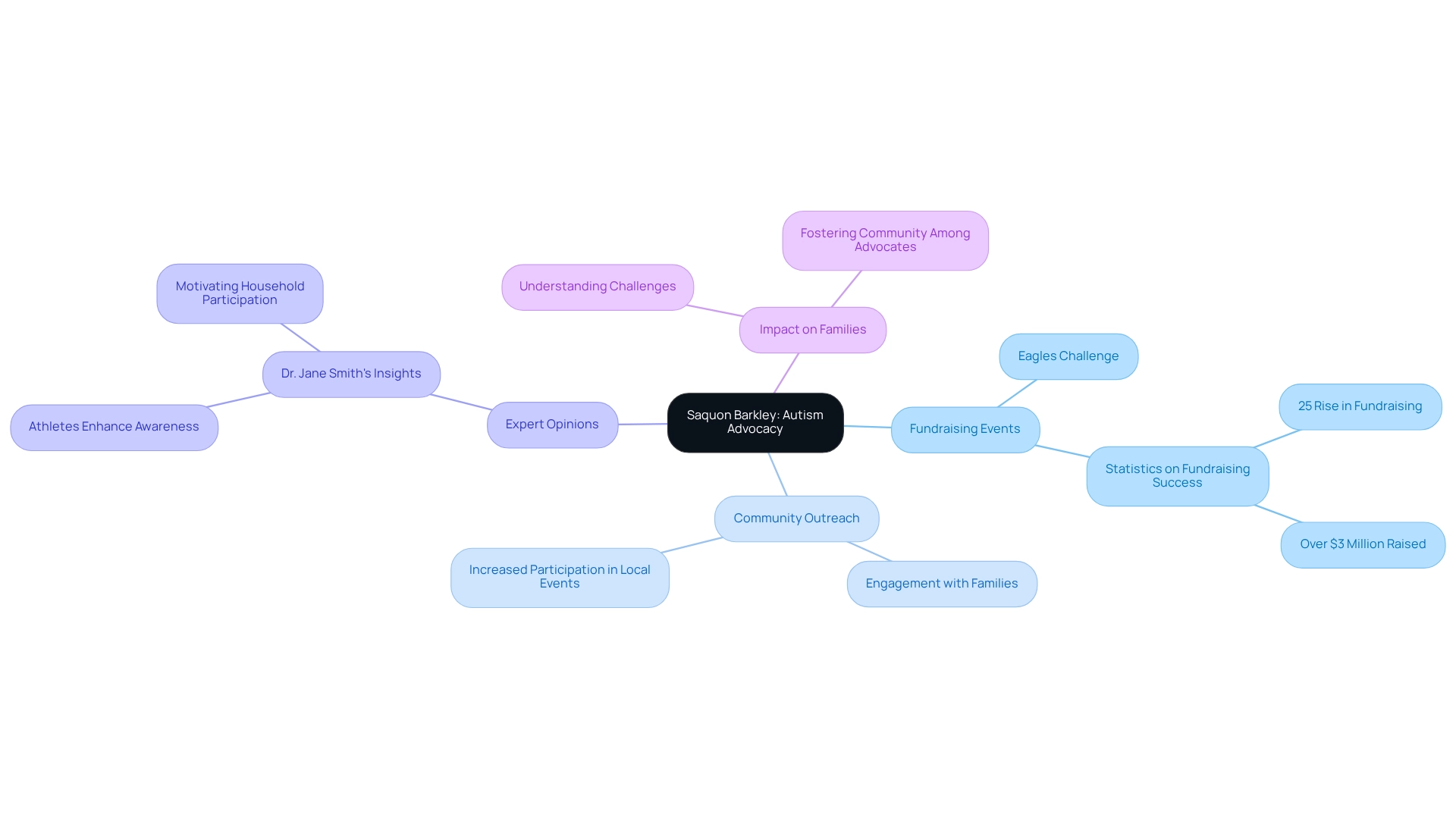
Julian Edelman: Using His Voice to Advocate for Autism Awareness
Julian Edelman, the former wide receiver for the New England Patriots, has emerged as a prominent advocate for understanding individuals on the spectrum. He leverages his platform to promote comprehension and support, showcasing a deep commitment to developmental disorder research and community initiatives through his participation in various fundraising campaigns and events. Notably, Edelman has championed educational initiatives aimed at informing fans and fellow athletes about the significance of backing the community related to developmental disorders. As we move into 2025, he continues to lead advocacy campaigns that not only generate funds but also enhance understanding through education.
Edelman's initiatives are crucial in highlighting the challenges faced by those on the spectrum. It’s concerning to note that approximately 28% of children with this condition exhibit self-injurious behaviors, which pose significant health risks. Additionally, the troubling statistic that 8% of autistic students in the U.S. do not complete high school underscores the urgent need for effective interventions and support systems.
The influence of athlete-led initiatives on understanding developmental disorders further strengthens Edelman's advocacy. These campaigns not only generate vital funding for research but also cultivate a culture of acceptance and understanding. For instance, in 2025, the New England Patriots have actively engaged in research initiatives related to developmental disorders, contributing to a broader movement aimed at improving outcomes for individuals with such conditions. This blend of understanding and acknowledgment fosters a more enriched and encouraging atmosphere for those with developmental differences.
Expert insights reveal that fundraising activities, like those organized by Edelman, are essential in enhancing understanding and support for those facing developmental challenges. By merging understanding with educational outreach, these initiatives empower families and communities alike. Parents are encouraged to involve themselves in these efforts, whether by participating in events or by promoting knowledge within their networks, to further uplift the community. Together, we can make a difference.
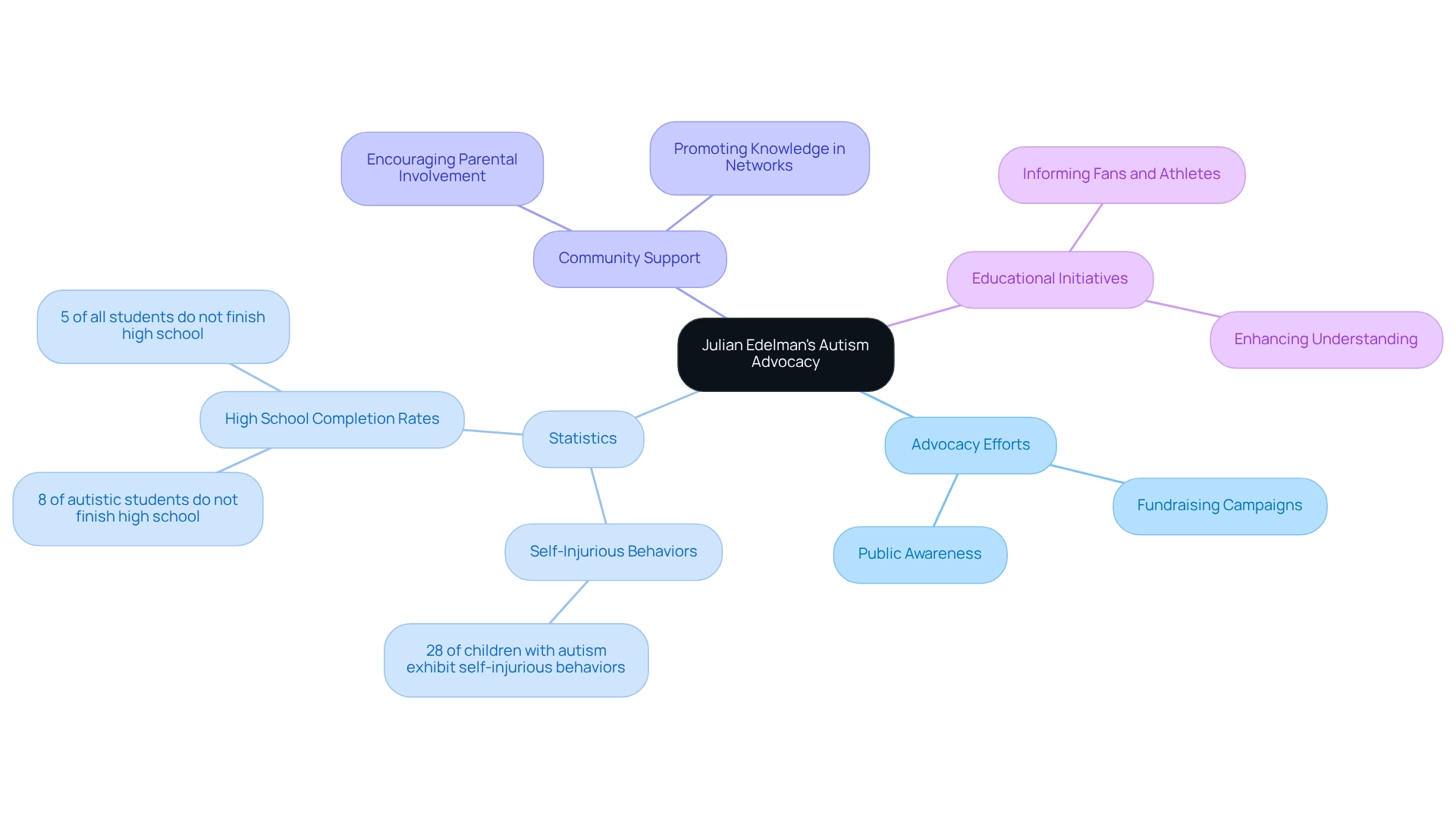
Aaron Rodgers: Supporting Autism Awareness Through Advocacy and Action
Aaron Rodgers, the quarterback for the New York Jets, has emerged as a compassionate advocate for understanding developmental disorders, particularly NFL autism, through his charitable initiatives. His heartfelt commitment to supporting families affected by challenges such as NFL autism is evident in his active involvement in various programs designed to raise awareness and provide essential resources. By leveraging his platform, Rodgers not only informs fans about NFL autism but also emphasizes the critical need for awareness and support within our communities.
As Walter Zahorodny describes the condition as an urgent public health crisis, the role of advocates like Rodgers becomes increasingly vital. His advocacy serves as a powerful reminder of how sports figures can inspire positive change, encouraging others to engage in meaningful initiatives that support individuals with NFL autism. Rodgers articulates this sentiment beautifully, stating, "Leadership can’t be forced or contrived. It has to be your personality," which reflects his sincere approach to advocacy.
Experts emphasize that the influence of public figures such as Rodgers can significantly enhance public understanding of NFL autism, fostering a more inclusive environment for those affected. Looking ahead to 2025, his initiatives continue to resonate, underscoring the lasting impact of philanthropy in advocating for individuals with developmental disorders and the importance of community involvement.
Moreover, experts like UCLA's Catherine Lord stress that prioritizing immediate support needs is essential. This reinforces the necessity of advocacy efforts that focus on the well-being of individuals with autism, rather than solely identifying causes. Together, we can create a supportive community that uplifts and empowers those facing these challenges.
Conclusion
The collective efforts of athletes such as Russell Wilson, Chris Godwin, Dan Orlovsky, Patrick Mahomes, DeAndre Hopkins, Michael Thomas, Saquon Barkley, Julian Edelman, and Aaron Rodgers highlight the vital role that sports figures can play in advocating for autism awareness. Each of these individuals has harnessed their platforms to raise essential funds, promote understanding, and nurture community support for families facing the challenges associated with Autism Spectrum Disorder. Their personal stories and unwavering commitment to the cause not only inspire others but also underscore the necessity of tailored resources and inclusive environments.
As this movement gathers momentum, it becomes increasingly evident that advocacy transcends mere awareness; it’s about fostering meaningful change that directly affects the lives of individuals with autism and their families. By concentrating on specific needs and encouraging community engagement, these athletes are effecting significant change, demonstrating that the intersection of sports and social responsibility can lead to profound transformations in public perception and support for autism initiatives.
Ultimately, the dedication of these athletes serves as a poignant reminder of our collective responsibility to support the autism community. Their actions inspire everyone to engage, educate, and advocate for a more inclusive society where individuals with autism can flourish. The momentum generated by such advocacy efforts can catalyze lasting change, ensuring that families affected by autism receive the understanding, resources, and support they rightfully deserve.
Frequently Asked Questions
What is the mission of ASD Media?
The mission of ASD Media is to unlock the potential of children with developmental disorders through effective strategies that manage challenging behaviors, navigate assistance services, and enhance social skills development.
How does ASD Media support parents and professionals involved in ABA therapy?
ASD Media provides essential insights and strategies through a wide range of resources designed to empower individuals in the neurodiverse community, helping them share experiences and thrive in learning.
What resources do members gain access to by signing up for the ASD Media newsletter?
Members gain access to the latest information and unlimited digital resources that help them support children with developmental disorders and ADHD.
What recent statistics highlight the effectiveness of ABA therapy?
Recent statistics indicate that 76% of patients experienced multiple goals trending upwards after implementing a hybrid ABA treatment model, demonstrating the effectiveness of tailored approaches in real-world settings.
Why is community support important for individuals with developmental disorders?
Community support is vital for advocacy, as it helps promote understanding and provides alternative therapy options that complement traditional ABA methods, leading to personalized treatment plans that cater to individual goals.
What role do celebrity advocates play in raising awareness for developmental disorders?
Celebrity advocates, such as Russell Wilson and Chris Godwin, significantly enhance public awareness and acceptance of developmental disorders through their initiatives and personal stories, fostering community engagement and support.
What impact does Russell Wilson's advocacy have on the community?
Russell Wilson's advocacy raises significant funds for research and promotes educational and health programs for children, encouraging community collaboration and addressing the urgent need for advocacy for those affected by developmental disorders.
How does Chris Godwin use his platform to support developmental disorder awareness?
Chris Godwin uses initiatives like 'My Cause My Cleats' to raise awareness about developmental disorders, sharing his personal experiences to inspire both fans and fellow athletes to engage in advocacy.
What percentage of autistic students in the U.S. do not complete high school?
Approximately 8% of autistic students in the U.S. do not complete high school, compared to 5% of all students, highlighting the need for advocacy and support.
What is the significance of personalized treatment plans in therapy for developmental disorders?
Personalized treatment plans are crucial as they focus on the unique requirements of individuals with developmental disorders, promoting progress and fostering community engagement rather than solely relying on diagnostic labels.




